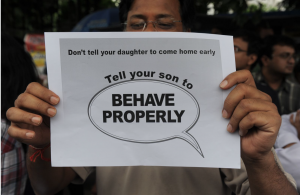At a Tedx talk session at Simon Fraser University, Maggie de Vries, talked about sex work, stigma and law. Maggie de Vries is the author of ‘Missing Sarah; a memoir of loss’, a book she wrote after her sister, Sarah went missing from Vancouver downtown east side. The book comprises of maggie’s experiences of dealing with the grief of loosing her sister, and entreries from Sarah’s journal that provide a first hand insight into Sarah’s troubled life. It is the process of writing this book that helped Maggie understand Sarah better, more than she knew Sarah while she was still alive. Learning about her sister’s struggles, she came to understand the suffering of sex workers and the stigma that we as a society have enforced upon them.
In her Tedx talk session she explains to the audience that sex work lies on the spectrum of limited choice to full choice. She talks about how Sarah was more inclined towards the limited choice section, because just like Sarah (a woman of colour), women from other marginalized groups such as aboriginal or black descent, do not have a lot of options for employment to begin with and society’s continued racial discrimination limit the options available for such women. On the other hand there are people who have full choice and still choose to make a career out of sex work. This links the concept of choice to voluntary action. Here De Vries draws the clear distinction between sex work and sex trafficking, the idea of consent and voluntary action. She explains how sex trafficking involves coercion and trickery, where the victim doesn’t even know what he or she is getting into but in sex work the individuals are fully aware of the implications of their and agree to do it none the less. Confusing the two professions and “treating sex work as if it is the same as sex trafficking both ignores the realities of sex work and endangers those engaged in it” (Ditmore). In her article ‘sex work, trafficking;understanding the difference‘, Melissa Ditmore explains how the conflation between trafficking and sex work law na policy has caused more problems for sex workers than help free people trapped in trafficking. She urges that there is a dire need for policy reform ,driven by logic and rational than emotion,in laws related to sex workers. Our society needs to destigmatize sex workers and treat sex work just as any other job in the service sector. This is what De Vries also mentions in her Tex talk session, that sex workers are not selling their body but rather a service, and their rights need to be acknowledged and safeguarded just as any other worker in the service sector.
Shedding more light on the topic of stigma, de Vries talks about how we use the term prostitute, more often then ‘sex worker’. It may be to induce shame or reinforce the stigma placed on them by us as a society.Women who go into prostitution are perceived as ‘bad women’ (Jiwani and Young,900) and seen as ‘throwaways of society’ (900) who are not worth saving or giving respect. But it is this very mindset that raises the question; how do prostitutes deserve to be treated? Aren’t they all just human beings at the basic level, just like all of us. Why is that we judge them as a good or a bad person based on their work, when we don’t judge ourselves on that scale?
In the talk session, De Vries recalls an incident where she was asked by a sex worker that they need allies, people who will stand with them as they try to decriminalize sex workers and detach the stigma attached with sex work. They have taken the initiative to voice out their side of the story and how they deserve to be treated. One such initiative i came across was the website called ‘Maggie’s, Toronto sex workers action project’, which is an organization run by sex workers to “assist sex workers in our efforts to live and work with safety and dignity” (Maggie’s). This organization has provided a platform for sex workers to come together and advocate for decriminalization of sex workers by creating awareness regarding the realities and implications of their work. They also state that sex trafficking is different from prostitution and how anti-trafficking laws and policies only help to reinforce stigma and leads to further criminalization and police harassment. Because of this conflation of the two fields, the real concern regarding the rights and safety of sex workers is over looked and thus their oppression and struggles continue. This conflation is what De Vries points to as well, by asking her audience, that we as a society need to stand with sex workers and decriminalize and remove stigma we have enforced upon them. Perhaps only then will they be able to feel safe and be able to live as normal members of our society.
Works cited
Jiwani, Yasmin and Young, Mary Lynn. “Missing and Murdered Women: Reproducing Marginality in News Discourse.” Canadian Journal of Communication 31.4 (2006): 895-917. Web. 3. Feb. 2016
Ditmore, Melissa. “Sex Work, Trafficking: Understanding the Difference.” RH Reality Check. N.p., 06 May 2008. Web. 29 Feb. 2016.
Maggie’s Toronto.” Maggie’s Toronto. N.p., n.d. Web. 29 Feb. 2016.
De Vries, Maggie. “The Red Umbrella — Sex Work, Stigma, & the Law | Maggie De Vries | TEDxSFU.” YouTube. YouTube, 24 Nov. 2014. Web. 29 Feb. 2016.
